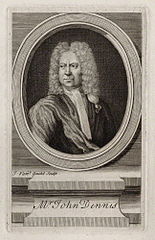This will be a short post. There’s just one part of Dennis’s Impartial Critick (1693) which caught my eye. It is found in the fifth dialogue, as the speakers continue to jusify (contra Rhymer) the absence of a chorus from the modern stage. Broadening the discussion, one interlocutor makes a comment about dramatic illusion:
BEAUM. Nay, I will grant you, that there is an occasion for us to give way to a wholesome delusion, if we design to receive either delight or profit from the Drama. But, however, a Poet is still to endeavour that his Representation be attended with as much probability as it is capable of: And it is much easier for a thousand Spectators to imagine themselves in some open place, either at Mycenae or Thebes, than to imagine themselves in a King’s Cabinet in either of those two places.

Johnson takes issue with such statements when he argues that it is just as easy to imagine oneself in Egypt as spending twenty four extremely busy hours in a chamber of a palace. What distinguishes Dennis from Johnson further is the idea of “wholesome delusion”, that the audience must be lost in the world of the play in order to benefit from the moral improvement it offers. A more sophisticated version of this, again against Johnson (and this time, I suspect, deliberately) is to be found in Elizabeth Montagu’s An Essay on the Writings and Genius of Shakespeare.
Her title’s ‘Writings and Genius’ actually echoes Dennis’s On the Genius and Writings of Shakespeare (1711). What goes around comes around.